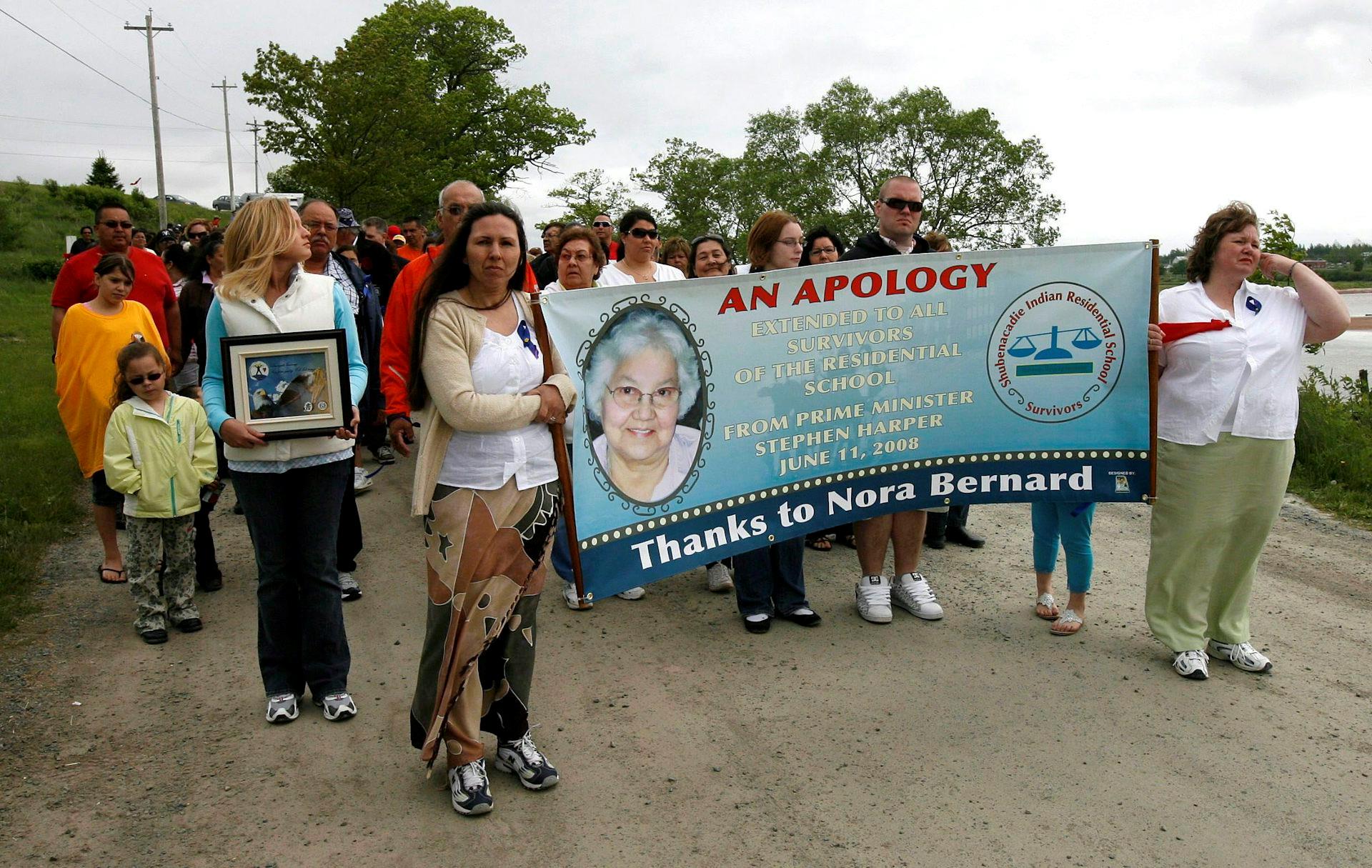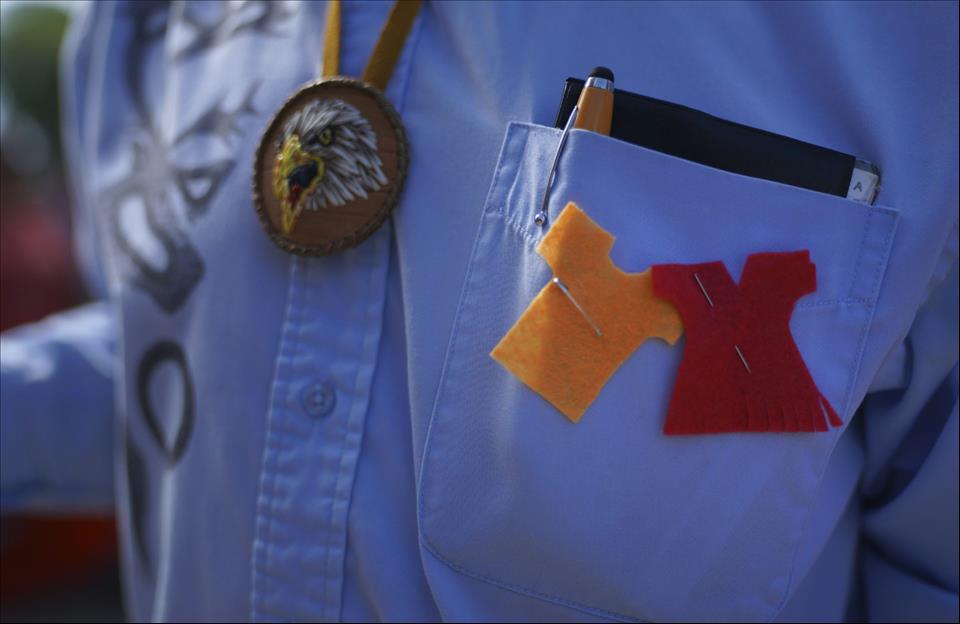What's Still Needed After The Pope's Residential Schools Apology? Sustained Action, Humility And Heart
As the first Latin American and Jesuit Pope, his leadership was marked by efforts to face difficult issues, including those affecting Indigenous Peoples in Canada.
One of the most significant moments of his papacy for this country was his historic public apology for the Catholic Church's role in the Indian Residential School system . This apology was long-awaited by Survivors, their families and Indigenous communities across Canada.
As the actions of the Truth and Reconciliation Commission (TRC) demonstrated , and as the Pope and many others noted during his visit and since that time, reconciliation is not a single event. It is a long and difficult process requiring sustained action, humility and heart.
Reclaiming with EldersI am a member of the Kainai Nation (Blood Tribe) of the Blackfoot Confederacy in Treaty 7 territory . My work focuses on reclaiming and reinterpreting the history of the Stolen Children Era alongside Blood Tribe Elders who are residential school Survivors. Through archival research and community partnerships, I examine the colonial policies behind multiple models of schooling imposed on Indigenous children, and how these systems operated.
Read more: National Day for Truth and Reconciliation: Exhibit features stolen Kainai children's stories of resilience on Treaty 7 lands
For more than 150 years , First Nations, Métis and Inuit children were taken from their families and placed in institutions aimed at erasing their identities, cultures and languages. These schools inflicted deep emotional, physical, sexual and spiritual harm .
The trauma of these events has created a legacy that reverberates through generations as intergenerational trauma. The first such school, the Mohawk Institute , opened its doors in 1831. The last, the Gordon Residential School , closed in 1996.
Brave testimoniesIn the 1980s, Survivors began to come forward in growing numbers to share the horrors they endured. Though many were initially met with disbelief, their collective voices grew stronger.
Brave testimonies by Survivors like Nora Bernard and many others ultimately led to the Indian Residential Schools (IRS) Settlement Agreement , the largest class-action suit in Canadian history .

Participants in an honour walk hold up a banner remembering Nora Bernard in June 2008 in Shubenacadie, N.S. THE CANADIAN PRESS/Mike Dembeck
As the truth emerged, formal apologies began to follow from various denominations: the United Church of Canada in 1986 and again in 1998 ; the Anglican Church of Canada in 1993 , 2019 and 2022 ; and the Presbyterian Church in 1994.
Noticeable absence was papal apologyCatholic religious orders or dioceses offered apologies (for example, the Oblate apology in 1991 ), but noticeably absent for many years was an apology from the highest leadership of the Roman Catholic Church.
In 2008, Prime Minister Stephen Harper issued a federal apology following the settlement agreement in 2007 .
In 2015, the Truth and Reconciliation Commission of Canada released 94 Calls to Action , which were concrete policy recommendations meant to guide Canada toward reconciliation. Call to Action No. 58 specifically called upon the Pope to issue an apology on Canadian soil to survivors, their families and communities for the Roman Catholic Church's role in the abuses that took place in residential schools.
Clear action plans?It was not until July 25, 2022, that Pope Francis formally issued the apology, during a historic visit to Maskwacis, Alberta.
Pope Francis is welcomed by a group of Indigenous leaders July 24, 2022, in Edmonton, Alberta. (AP Photo/Eric Gay)
Reactions to the apology have been mixed. For some, it marked a long-overdue acknowledgment, becoming a symbolic step toward healing. For others, it fell short .
Critics noted that Pope Francis spoke of the abuses as being carried out by “members of the church” rather than clearly naming the institutional role of the Roman Catholic Church itself. He also failed to explicitly name all forms of abuse, omitting mention of the sexual and spiritual violence that Survivors so courageously brought to light.
Perhaps most importantly, his apology lacked a clear action plan for justice, reparations or long-term reconciliation.
Read more: Pope's visit to Canada: Indigenous communities await a new apology - and a commitment to justice
There have been some signs of progress. For example:
-
The Canadian Catholic Church launched a $30 million Indigenous Reconciliation Fund , a not-for-profit charity with an independent board and members comprised of Indigenous and non-Indigenous leaders, to support initiatives related to: healing and reconciliation for communities and families; culture and language revitalization; education and community building; and dialogues for promoting Indigenous spirituality and culture.
Some funds have supported Indigenous languages and customs in Catholic services or communities; these point to existing or possible emerging practices of churches with Indigenous members that incorporate Indigenous ceremony. The Vatican formally repudiated the Doctrine of Discovery in 2023 - an important but symbolic move rejecting the colonial-era justification for land dispossession.
Read more: The Vatican just renounced a 500-year-old doctrine that justified colonial land theft ... Now what? - Podcast
-
Some Catholics are involved in networks concerned with genuine listening, creating a “culture of encounter” or church governance that is more open, inclusive and accountable .
But many questions remain. For example:
-
While there has been some progress accessing church records , significant records remain hard to locate. For example, I am still looking for the intake and discharge ledgers for most of the schools that my People attended. In my experience working with different archives across Canada, some archivists are more forthcoming than others about their material and processes - for example, about whether archival finding aids detail restricted material.
The church has yet to return Indigenous artifacts held in the Vatican Museums . Many Survivors still wait for explicit financial reparations beyond the $30 million fund .
Elders smudge people in Winnipeg on the National Day for Truth And Reconciliation on Sept. 30, 2021. THE CANADIAN PRESS/John Woods
-
Christine Jamieson, associate professor of theological studies, has noted there is work to be done around addressing ongoing“spiritual violence” against Indigenous traditions by the Catholic Church and other Christian churches . How churches respond to Indigenous knowledge and theories of knowlege has implications for ethical research, education and religious practices. The TRC's Calls to Action No. 59 and No. 60 are about church parties to the IRS Settlement Agreement developing ongoing education strategies and curriculum.
As Sen. Murray Sinclair once wisely noted:“It took seven generations to create the harm through the residential schools . It will take a few generations to turn it around.”
Pope Francis took a first step. The path ahead continues to call for sustained honesty, accountability and commitment from Catholic leaders in Canada and in Rome.
Let us hope that work continues to not only build upon Pope Francis's initial steps, but to have the courage to speak the truth plainly, act with integrity and walk alongside Indigenous Peoples in the ongoing work of meaningful, lasting reconciliation.
This is a commitment that must endure for generations. May this moment be the seed from which true and lasting transformation can continue to grow.

Legal Disclaimer:
MENAFN provides the
information “as is” without warranty of any kind. We do not accept
any responsibility or liability for the accuracy, content, images,
videos, licenses, completeness, legality, or reliability of the information
contained in this article. If you have any complaints or copyright
issues related to this article, kindly contact the provider above.
Most popular stories
Market Research

- Stonehaven Circle Marks 13Th Anniversary With Hadrian Colwyn Leading Calvio Ailegacyx Innovation
- Bitmex Launches Alpha Showdown Trading Competition Featuring 3 BTC Prize Pool And Additional Rewards
- Thrivestate Launches“Fly Before You Buy” Program, Enabling International Buyers To Explore Dubai Before Committing
- 1Inch Becomes First Swap Provider Relaunched On OKX Wallet
- Ozak AI Partners With Pyth Network To Deliver Real-Time Market Data Across 100+ Blockchains
- Xfunded Expands In Dubai, Strengthening Collaborations With Trading Influencers Across Europe




















Comments
No comment